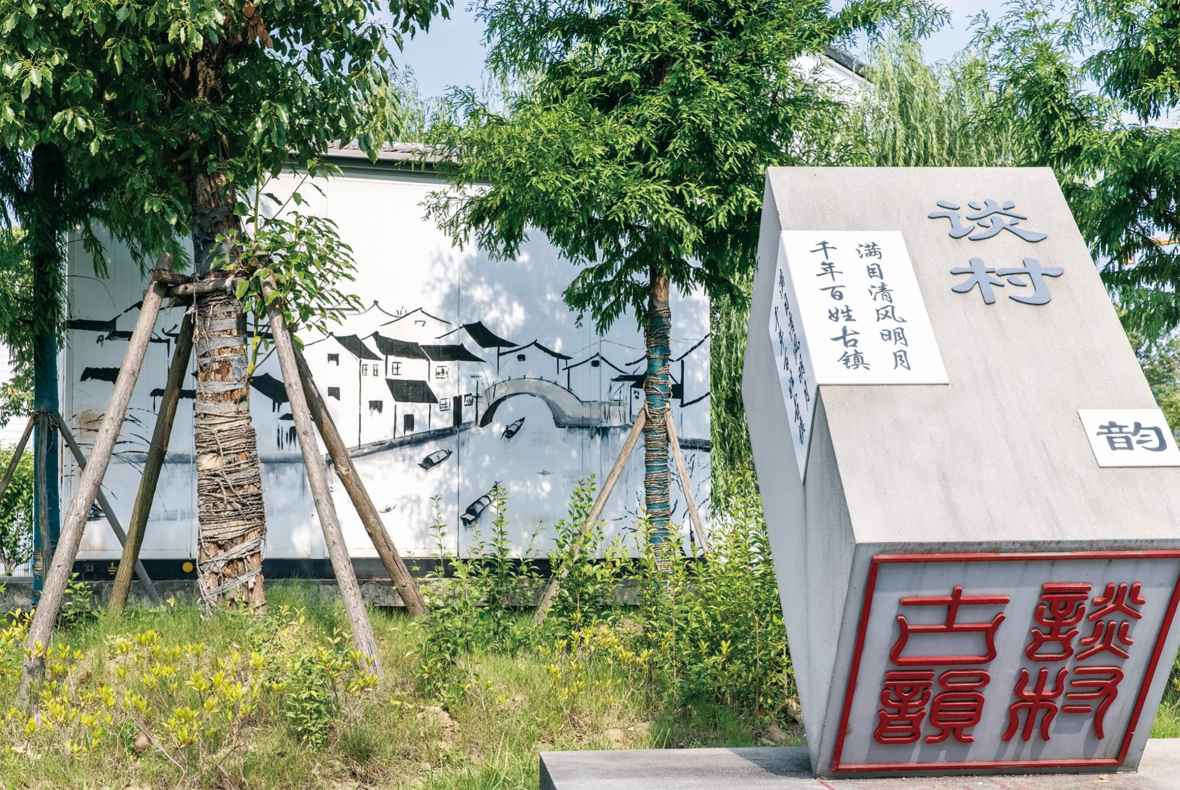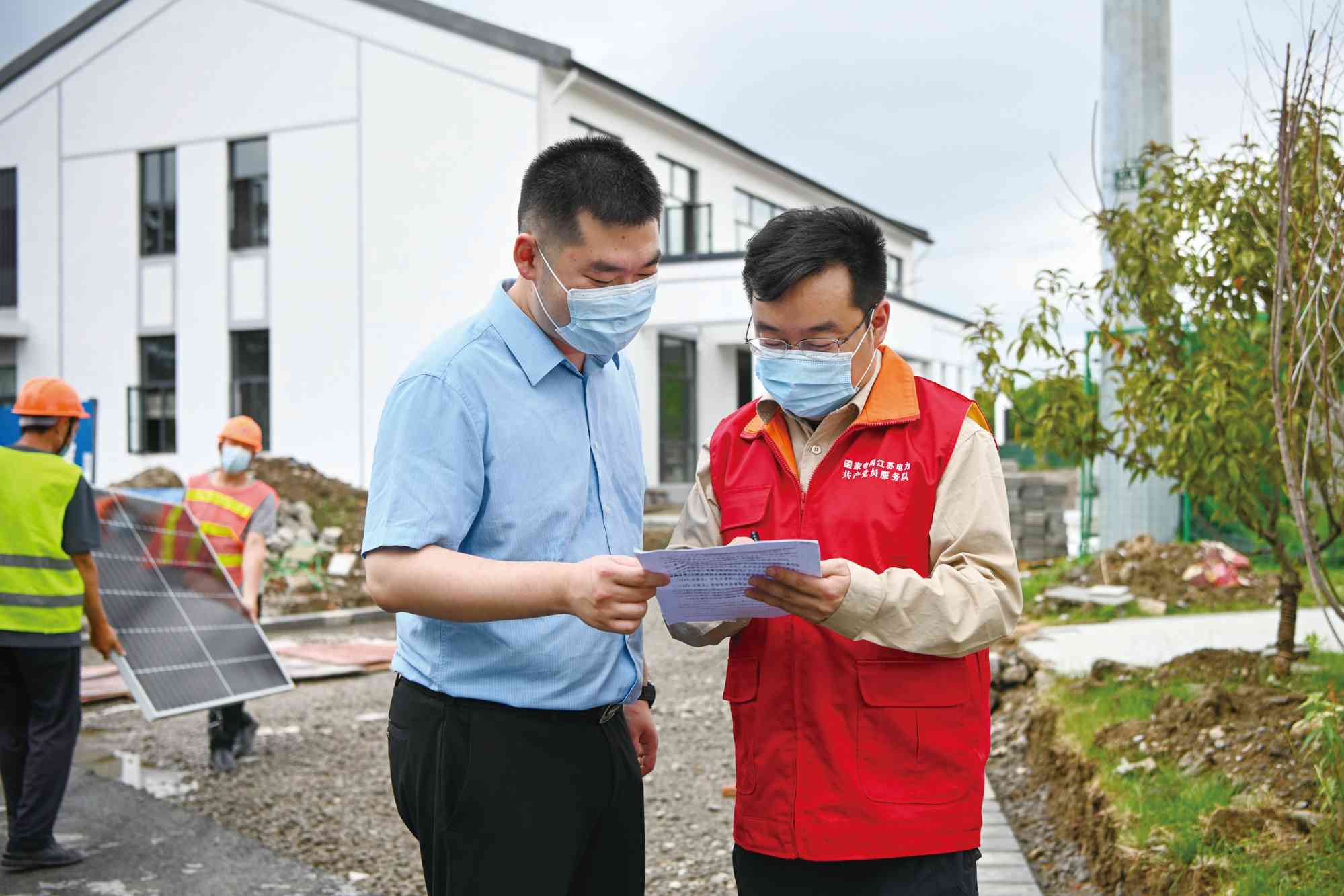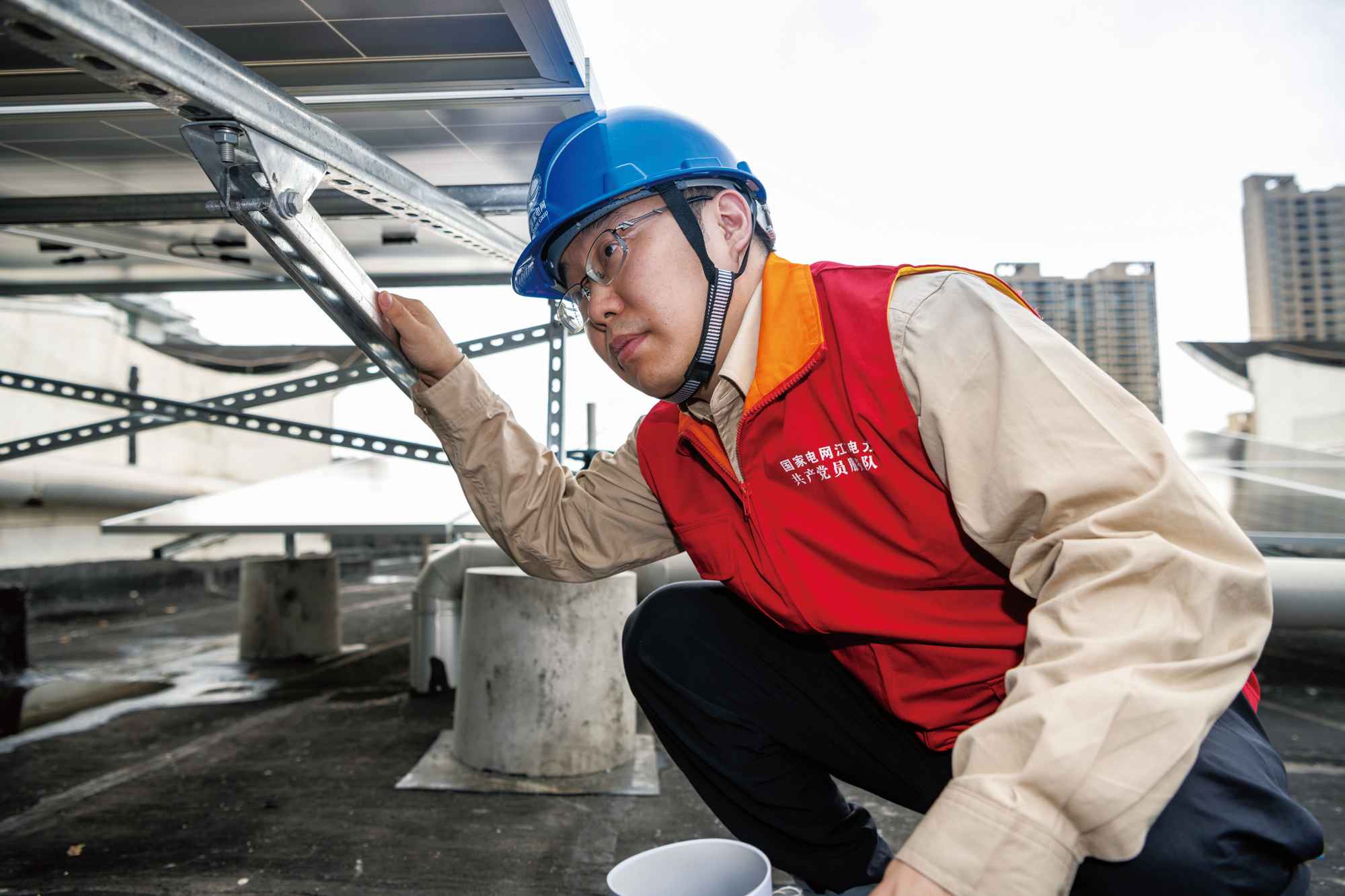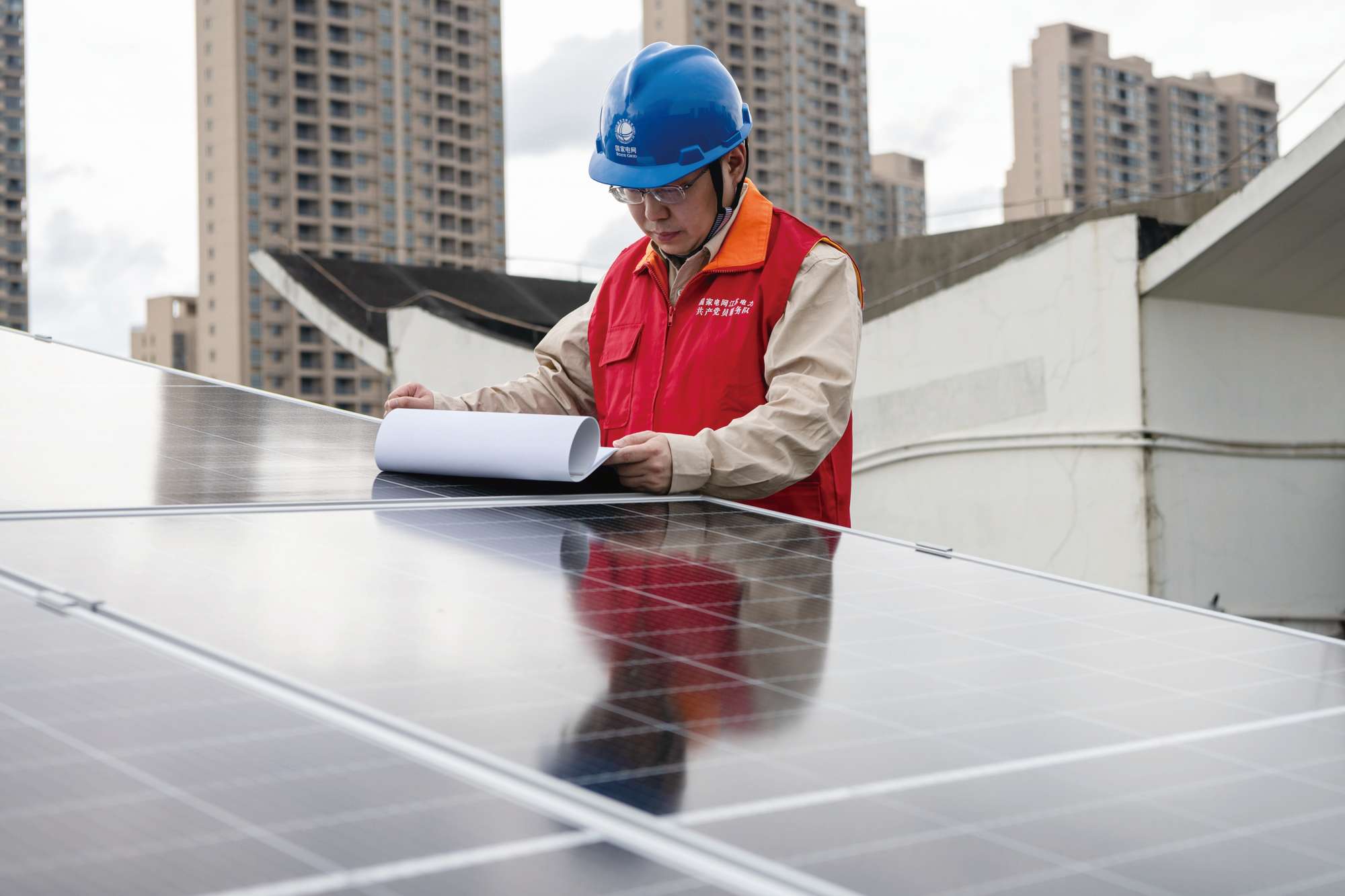A village cinema encapsulates the inspiring story of how the high-quality development of the power system is reshaping and rejuvenating rural China.
As the first village-level cinema in Wuxi, Jiangsu Province, the Tancun Village Cinema stands as a testament to the life journeys of many generations. It has not only been a silent observer to the dedication of film projectionist Old Mr.Jiang and the growth of Jiang Fan from State Grid Wuxi Power Supply Company but also the sweeping transformations this picturesque village has experienced over the decades. From the transformation of rural grids to the “new power system micro grids”, with the support of high-quality power supply, an increasing number of sustainable development stories are happening in China’s rural areas.

At the foot of the lush green Houshan Mountain, the Jiuli River meanders through the whitewashed, tile-roofed traditional houses. Ancient trees and bridges create a serene and picturesque scene amidst the evening’s cooking smoke. This is Tancun Village in Wuxi, Jiangsu Province, a quintessential village in the southern region of the Yangtze River’s lower reaches, once served as the filming location of the early 1980s movie “A Small Boat”. Tancun Village isn’t particularly large. It spans an area of approximately 68 hectares, with a registered population of less than a thousand. In the 1960s and 1970s, Tancun Village was an impoverished rural community, where the cultural life of its residents was notably uneventful. Watching outdoor movies was a rare and treasured source of entertainment for the villagers.
Old Mr.Jiang served as the generator operator for the village’s movie projection team. On balmy summer nights, resonating with the chorus of cicadas, Jiang would ceremoniously step behind the screen. As he cranked the generator, the movie “Tunnel Warfare” came to life amid the villagers’ joyful cheers.
On those memorable nights, a love story blossomed. As Jiang worked diligently to crank the generator, his future wife would sit quietly beside him, and occasionally offering him some broad beans during his short breaks. In later years, Old Jiang fondly recounted this beautiful memory to his son, Jiang Fan. This hand-cranked generator not only illuminated his youth and love, but also marked the beginning of the beautiful rural life in Tancun Village
Prelude: No electricity, no movies
In the early 1980s, the waves of reform and “opening-up” reached Tancun Village. Tancun was among the pioneers in implementing economic reforms, and the village’s overall economic situation saw significant improvement. In Tancun, there was even the very first village movie theater in Wuxi. Mr.Jiang, the former member of the projection team, also took on the role of maintaining the movie theater.
Because of his father’s job, Jiang Fan spent most of his childhood in the movie theater. His father frequently brought him to the projection room. As a young child, he couldn’t grasp the link between the luminous black box and his own life. He was just curious: where does the electricity for screening movies come from?
In 1985, the movie “Romance on Lushan Mountain” was playing at the Tancun Village movie theater. On the screen, the male and female leads lying by the Lushan Waterfall were slowly drawing closer to each other. Then, with a sudden “click,” the theater went completely dark. Amid the startled exclamations of the audience, Jiang Fan heard the term “power outage” for the first time.
Jiang Fan walked out of the movie theater along with his mother and the disappointed crowd. He saw his father, Old Jiang, engaged in an argument with the head of the production team. It turned out that the village’s burgeoning irrigation demands during the peak farming season were straining the power station’s capabilities. It became unfeasible to power field irrigation and movie screenings simultaneously.
Old Jiang intended to negotiate further, but the head of the production team resolutely refused, stating, “This really wouldn’t work. During the busy farming season, we need electricity as a priority. The village can’t afford another power outage!” Recognizing the stakes at hand, Old Jiang chose not to argue any further and turned to walk back home.
On the way back home, Jiang Fan attentively observed the night in Tancun Village for the first time. Amid the soft embrace of the darkness, the distant mountain silhouettes stood sentinel, while the vibrant hues of wildflowers lay hidden. Due to the demands of the busy farming season, electricity usage was rationed, and only a few distant lights flickered. “In the past, even with our hand-cranked generator, it was just these dim lights. Without electricity, there is no movies,” his father’s words made the young Jiang Fan understand that electricity could bring vibrant colors to life.
Growth: A Marathon of rural power grid transformation
In the late 1990s, a nationwide transformation of the rural electric grid was in progress, and electricity poles sprung up in Tancun Village. Every household was connected to electricity, and the days of power rationing became a relic of history. Television sets and radios are common in numerous households. However, due to planning considerations, the Tancun Village movie theater had to temporarily halt its screenings. This left Old Mr. Jiang idle at home, and he felt disheartened for a considerable period.
The rapid transformations in his hometown reinforced Jiang Fan’s conviction regarding the significance of electricity for rural development. Following his university graduation, he firmly chose to return to his village and contribute to the advancement of the electrical infrastructure. He decided to work at the Xishan district power station of State Grid Wuxi Power Supply Company. This choice was met with both surprise and joy by his parents. When Jiang Fan put on the State Grid uniform, it was during a period of rapid growth for township enterprises in the southern region of the Yangtze River’s lower reaches. In just over a decade, a multitude of factories, spanning machinery, material companies, and industries including copper, textiles, electronics, and blankets, have all sprang up one after another, transforming Tancun Village into one of the first “Income reached over RMB 100 million villages” across the country. Furthermore, the introduction of smart agricultural machinery to rural areas facilitated the expansion of organic farming, with agricultural processing moving steadily toward full automation and mechanization.

The rapid development of industries heavily relies on the upgrade of electrical infrastructure. To address common issues in rural power grids such as low transformer capacity and outdated distribution equipment, State Grid Wuxi Power Supply Company carried out a comprehensive rural grid transformation to enhance the power supply capacity of Tancun Village. This was a project built from the ground up, akin to a marathon. During those years, in order to replace the old power lines and upgrade transformers for Tancun Village, Jiang Fan and his colleagues tirelessly worked in every corner of the village. They conducted inspections while recording data, climbed hundreds of electrical poles, and carried out countless tasks such as wire-making and wire installation.
Starting with just a single 50kVA transformer, every nook and cranny of Tancun Village experienced a gradual electrification. Jiang Fan vividly recalled that, following the initial phase of rural grid transformation, the village successfully achieved “well pump electrification,” a development that significantly eased irrigation for local farmers. As they gazed upon the flourishing fields, the production team leader who had once clashed with Old Jiang firmly grasped Jiang Fan’s hand, and Jiang Fan reciprocated with a firm grip. Although no words were exchanged, they did feel the same great joy in their hearts.
Upgrade: Rural expansion of distributed photovoltaic systems
In 2018, Tancun Village took the lead in launching a comprehensive village reconstruction project, requiring another round of upgrades and transformations for the village’s power grid.
In 2021, in response to the call for raising cultural and ethical standards in rural areas,Tancun Village initiated plans to refurbish its movie theater and establish a rural film memory museum to preserve the village’s cinematic legacy. During the same year, State Grid Wuxi Power Supply Company and the government of Xishan district pioneered the creation of a district-level “Direct Power Service” collaborative mechanism, jointly explored comprehensive control and scheduling of distributed photovoltaic projects, and developed an online monitoring and energy efficiency service platform for photovoltaic systems. Notably, Tancun Village emerged as a pivotal community in State Grid Wuxi Power Supply Company’s pilot initiative for building “new power system microgrids.”
Community-based PEDF (Photovoltaics, Energy Storage, Direct Current, and Flexibility) projects involve implementing photovoltaic, energy storage, DC distribution, and flexible interaction technologies on public buildings within communities. This approach offers benefits like minimal DC transmission losses, high efficiency, and convenient on-site power utilization. It plays a vital role in achieving comprehensive carbon peak and carbon neutrality objectives, driving rural revitalization, and boosting income for farmers. Given Tancun Village’s development of new countryside, State Grid Wuxi Power Supply Company engaged in discussions with pertinent investment entities regarding construction plans. The ultimate decision was reached, with Wuxi Xishan Zhongneng Green Energy New Energy Co., Ltd. providing the funding for the installation of distributed photovoltaic equipment on newly constructed village residences and public facilities. This system would cater to the daily electricity demand of the residents while any surplus energy would be stored in energy storage devices and released during peak demand periods. This excess energy would be channeled for the direct current charging of new energy vehicles, facilitating a flexible and efficient allocation of electrical resources.
Learning that the movie theater was also included in Tancun Village’s new building distribution system blueprint, Jiang Fan immediately volunteered to join the grid upgrade and renovation project, which aims at preserving memories and revitalizing the village. His primary role involved supervising the installation of a 0.556MW distributed photovoltaic project on the rooftops of Tancun’s village committee office, the movie theater, and selected residential buildings. In addition to meeting the electricity needs of these locations, any excess electricity would be connected to the grid. Photovoltaic panels convert solar energy into direct current (DC), which is then transformed into alternating current (AC) through grid-tied inverters before being integrated into the 0.4kV grid connection box. This not only provides clean energy to the villagers but also enhances the operational capacity and energy efficiency of the distribution grid. Furthermore, it offers additional benefits such as thermal insulation, reduced roof aging, and effective lightning protection.
During his leisurely strolls around the village, Old Jiang would often come across Jiang Fan as he installs photovoltaic panels and brackets on rooftops. Whenever this happens, Old Jiang pauses to watch his son working and emphasizes the importance of caution and safety. Jiang Fan would acknowledge his father’s concern with a reassuring wave. “By enhancing the village’s power grid, we can offer our own parents a better life. This is the essence of rural revitalization,” Jiang Fan, his skin tanned by the sun, has arrived at this straightforward yet profound realization.
Mission: Safeguarding a better life
In 2023, Jiang Fan invited his parents to the cultural center transformed from Tancun Village’s movie theater to watch “The Battle at Lake Changjin”. The state-of-the-art projection equipment and sound effects brought the gunfire, combat, and explosions from the movie to life. Old Jiang, seated in the newly renovated screening hall, occasionally took a look at a family photo taken in the old movie theater, a smile of nostalgia brightening his face.
After watching the movie, Jiang Fan took a new family photo with his parents in front of the new cultural center. The elderly couple walked hand in hand out of the cultural center and strolled through the village, with Jiang Fan following them, just like when he was a child.
They walked past the photovoltaic pavilion near the movie theater. The seating under the pavilion offered a spot for pedestrians to take a break. The pavilion’s roof featured photovoltaic technology, producing clean electricity daily to illuminate the pavilion throughout the night, with a product lifespan of up to 25 years.
They walked past the wind-solar hybrid streetlights near Tancun’s village committee office. These streetlights can provide continuous illumination around the clock without requiring an external power supply.
They walked past the photovoltaic carport in front of Tancun’s Party-Mass Service Center. Apart from providing shelter from rain and sun for cars, the carport also offers three 80kW
dual-charger fast charging piles, ever-ready for electric vehicles.
While chatting and strolling, the family spotted more new energy facilities, including charging piles, rooftop solar installations, residential energy storage devices, DC distribution networks, and so forth. Beyond the horizon, transmission towers punctuated the fields, while atop newly constructed houses, neatly arranged photovoltaic equipment caught their eyes. Today, Tancun is steadily advancing toward “zero-carbon energy supply” and has gained recognition as a prominent demonstration zone for “carbon peaking” and “carbon neutrality”. Once all the transformations are completed, the rooftop photovoltaic systems in the village are projected to deliver an annual output of 777,600 kilowatt-hours, resulting in savings of 223.28 tons of coal equivalent (TCE) and a reduction of 580.87 tons of carbon dioxide emissions.
As Jiang Fan watched his aging parents, memories from the past kept resurfacing in his mind. He recalled his early childhood as a curious toddler, gazing at the generator his father was cranking. Memories of going to the movie theater with his parents during his youth also came flooding back. He thought of his father’s disappointed and helpless look during power outages, and he reflected on the original aspiration behind his decision to join State
Grid Wuxi Power Supply Company.
Decades of romance between parents, the vitality of youth, and the rapid development of China – all these cherished memories of Jiang Fan’s family, every resident of Tancun Village, and all Chinese people have found a home within the “rural film memory museum.” In the future, more stories about carbon peaking and neutrality, rural revitalization, and shared prosperity will begin in Tancun Village.
“From being a hand-crank generator operator to working as a staff member at the movie theater, my father infused vibrancy into our otherwise uneventful rural life through hard work. Now, it’s my responsibility to carry forward this legacy.” As he gazed at the colorful wildflowers on the field ridges illuminated by lights, Jiang Fan sighed with profound emotions, “To charge a wonderful life, to empower a beautiful China, and to keep the lights for countless families, these are my lifelong missions.”







 Back
to top
Back
to top